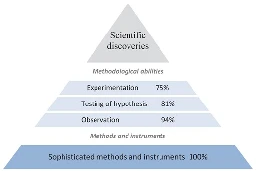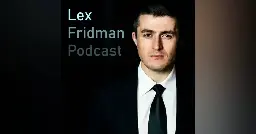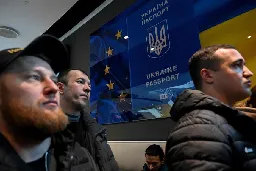Abstract. Scientific, medical, and technological knowledge has transformed our world, but we still poorly understand the nature of scientific methodology.

We can best view the method of science as the use of our sophisticated methodological toolbox
Metadata
- Author: OUP Academic
- Category: article
- URL: https://academic.oup.com/pnasnexus/article/3/4/pgae112/7626940?login=false
Highlights
>Scientific, medical, and technological knowledge has transformed our world, but we still poorly understand the nature of scientific methodology.
>scientific methodology has not been systematically analyzed using large-scale data and scientific methods themselves as it is viewed as not easily amenable to scientific study.
>This study reveals that 25% of all discoveries since 1900 did not apply the common scientific method (all three features)—with 6% of discoveries using no observation, 23% using no experimentation, and 17% not testing a hypothesis.
>Empirical evidence thus challenges the common view of the scientific method.
>This provides a new perspective to the scientific method—embedded in our sophisticated methods and instruments—and suggests that we need to reform and extend the way we view the scientific method and discovery process.
>In fact, hundreds of major scientific discoveries did not use “the scientific method”, as defined in science dictionaries as the combined process of “the collection of data through observation and experiment, and the formulation and testing of hypotheses” (1). In other words, it is “The process of observing, asking questions, and seeking answers through tests and experiments” (2, cf. 3).
>In general, this universal method is commonly viewed as a unifying method of science and can be traced back at least to Francis Bacon's theory of scientific methodology in 1620 which popularized the concept
>Science thus does not always fit the textbook definition.
>Comparison across fields provides evidence that the common scientific method was not applied in making about half of all Nobel Prize discoveries in astronomy, economics and social sciences, and a quarter of such discoveries in physics, as highlighted in Fig. 2b. Some discoveries are thus non-experimental and more theoretical in nature, while others are made in an exploratory way, without explicitly formulating and testing a preestablished hypothesis.
>We find that one general feature of scientific methodology is applied in making science's major discoveries: the use of sophisticated methods or instruments. These are defined here as scientific methods and instruments that extend our cognitive and sensory abilities—such as statistical methods, lasers, and chromatography methods. They are external resources (material artifacts) that can be shared and used by others—whereas observing, hypothesizing, and experimenting are, in contrast, largely internal (cognitive) abilities that are not material (Fig. 2).
>Just as science has evolved, so should the classic scientific method—which is construed in such general terms that it would be better described as a basic method of reasoning used for human activities (non-scientific and scientific).
>An experimental research design was not carried out when Einstein developed the law of the photoelectric effect in 1905 or when Franklin, Crick, and Watson discovered the double helix structure of DNA in 1953 using observational images developed by Franklin.
>Direct observation was not made when for example Penrose developed the mathematical proof for black holes in 1965 or when Prigogine developed the theory of dissipative structures in thermodynamics in 1969. A hypothesis was not directly tested when Jerne developed the natural-selection theory of antibody formation in 1955 or when Peebles developed the theoretical framework of physical cosmology in 1965.
>Sophisticated methods make research more accurate and reliable and enable us to evaluate the quality of research.
>Applying observation and a complex method or instrument, together, is decisive in producing nearly all major discoveries at 94%, illustrating the central importance of empirical sciences in driving discovery and science.
Cyber operations reveal their limitations as means of warfare, but territorial conquest opens unique opportunities for exploitation.

Cyber Conflict and Subversion in the Russia-Ukraine War
Metadata
- Author: Default
- Category: article
- URL: https://www.lawfaremedia.org/article/cyber-conflict-in-the-russia-ukraine-war
Highlights
>The Russia-Ukraine war is the first case of cyber conflict in a large-scale military conflict involving a major power.
>Contrary to cyberwar fears, most cyber operations remained strategically inconsequential, but there are several exceptions: the AcidRain operation, the UKRTelecom disruption, the September 2022 power grid sabotage, and the catastrophic Kyivstar outage of 2023.
>These developments suggest hacking groups are increasingly fusing cyber operations with traditional subversive methods to improve effectiveness.
>The first exceptional case is AcidRain. This advanced malware knocked out satellite communication provided by Viasat’s K-SAT service across Europe the very moment the invasion commenced. Among the customers of the K-SAT service: Ukraine’s military. The operation that deployed this malware stands out not only because it shows a direct linkage to military goals but also because it could have plausibly produced a clear tactical, potentially strategic, advantage for Russian troops at a decisive moment.
>The second exception is a cyber operation in March 2022 that caused a massive outage of UKRTelecom, a major internet provider in Ukraine. It took only a month to prepare yet caused significant damage. It cut off over 80 percent of UKRTelecom’s customers from the internet for close to 24 hours.
>Finally, the potentially most severe challenge to the theory of subversion is a power grid sabotage operation in September 2022. The operation stands out not only because it used a novel technique but also because it took very little preparation. According to Mandiant, it required only two months of preparation and used what is called “living off the land” techniques, namely foregoing malware and using only existing functionality.
>After all, why go through the trouble of finding vulnerabilities in complex networks and develop sophisticated exploits when you can take the easy route via an employee, or even direct network access?
Researchers are discovering how music affects the brain, helping us to make sense of its real emotional and social power.

Some article from the past ;)
Why We Love Music
Metadata
- Author: Jill Suttie
- Category: article
- URL: https://greatergood.berkeley.edu/article/item/why_we_love_music
Highlights
>Using fMRI technology, they’re discovering why music can inspire such strong feelings and bind us so tightly to other people.
>“A single sound tone is not really pleasurable in itself; but if these sounds are organized over time in some sort of arrangement, it’s amazingly powerful.”
>There’s another part of the brain that seeps dopamine, specifically just before those peak emotional moments in a song: the caudate nucleus, which is involved in the anticipation of pleasure. Presumably, the anticipatory pleasure comes from familiarity with the song—you have a memory of the song you enjoyed in the past embedded in your brain, and you anticipate the high points that are coming.
>During peak emotional moments in the songs identified by the listeners, dopamine was released in the nucleus accumbens, a structure deep within the older part of our human brain.
>This finding suggested to her that when people listen to unfamiliar music, their brains process the sounds through memory circuits, searching for recognizable patterns to help them make predictions about where the song is heading. If music is too foreign-sounding, it will be hard to anticipate the song’s structure, and people won’t like it—meaning, no dopamine hit. But, if the music has some recognizable features—maybe a familiar beat or melodic structure—people will more likely be able to anticipate the song’s emotional peaks and enjoy it more. The dopamine hit comes from having their predictions confirmed—or violated slightly, in intriguing ways.
>On the other hand, people tend to tire of pop music more readily than they do of jazz, for the same reason—it can become too predictable.
>Her findings also explain why people can hear the same song over and over again and still enjoy it. The emotional hit off of a familiar piece of music can be so intense, in fact, that it’s easily re-stimulated even years later.
>“Musical rhythms can directly affect your brain rhythms, and brain rhythms are responsible for how you feel at any given moment,” says Large.
>“If I’m a performer and you’re a listener, and what I’m playing really moves you, I’ve basically synchronized your brain rhythm with mine,” says Large. “That’s how I communicate with you.”
>He points to the work of Erin Hannon at the University of Nevada who found that babies as young as 8 months old already tune into the rhythms of the music from their own cultural environment.
>“Liking is so subjective,” he says. “Music may not sound any different to you than to someone else, but you learn to associate it with something you like and you’ll experience a pleasure response.”
More than 70 years ago, mathematician Alan Turing proposed a mechanism that explained how patterns could emerge from bland uniformity. Scientists are still using his model — and adding new twists — to gain a deeper understanding of animal markings.

Interesting findings
This is what you get when are not sleeping during biology classes.
#420 – Annie Jacobsen: Nuclear War, CIA, KGB, Aliens, Area 51, Roswell & Secrecy

Notes from the podcast:
>The president has sole authority to initiate a nuclear war without needing approval from anyone else, emphasizing the speed of decision-making in such scenarios.
>Post-nuclear war scenarios lack population protection planning, requiring individuals to rely on their own resources for survival.
>Building trust with primary sources for reporting involves navigating conflicts between personal and professional information, especially in high-stakes environments like national security.
>The revelation of the Roswell crash being a hoax orchestrated by Stalin highlights the intricate world of government intrigue and secrecy.
>Title 50 allows for covert operations like the assassination of Bin Laden in Pakistan, showcasing the blurred lines between military and intelligence operations.
>CIA covert operations raise ethical dilemmas, with discussions around the role of assassination in geopolitics and military operations.
>Obtaining unbiased insights from different intelligence agencies requires extensive research and multiple sources, emphasizing the importance of transparency in investigative journalism.
>Surveillance techniques have evolved to include mass biometric data collection, raising concerns about privacy and the implications of widespread surveillance in modern society.
Over the past four centuries quadrillions of ants have created a strange and turbulent global society that shadows our own

Poland has tens of thousands of Ukrainian men of military age on its territory, according to UN figures. Read more at straitstimes.com.

Kyiv has long been pressing for hi-tech Patriot systems to defend against deadly Russian attacks.

It’s not 1914 anymore

a source code of a game ;))
Descent 3 by Outrage Entertainment. Contribute to kevinbentley/Descent3 development by creating an account on GitHub.

In which I try to be Gandalf instead of Cassandra.

i am all for normalizing raiding ambassies for [put the cause you support] as well
woah, so nothing is sacred now? 😱🤔😐
Paris would send ‘hundreds’ of vehicles over the next year, Sébastien Lecornu tells La Tribune Dimanche.

Poland says Russian missile targeting Ukraine’s Lviv region violated its airspace while Kyiv suffers third pre-dawn attack in four days

The fabric of the cosmos, as we understand it, comprises three primary components: 'normal matter,' 'dark energy,' and 'dark matter.'

Heh
Ukrainian and allied officials have criticized Pope Francis for saying that Kyiv should have the “courage” to negotiate an end to the war with Russia

thank you, actually it seems that it is https://en.m.wikipedia.org/wiki/The_Sliced-Crosswise_Only-On-Tuesday_World , which has inspired Dayworld :)
looks interesting, but not this one.
Trying to find a book - remember the story vaguely, read it maybe 20-30 years ago. People are living/working on assigned weekdays and sleep in others, a couple are interested to move to the same day and somebody arranges it to fail in some way.
For a flight to be imperiled by a simple and preventable manufacturing or maintenance error is an anomaly with ominous implications.

>Securing bolts properly is about the lowest-hanging fruit of high-reliability engineering.
Unsanctioned entities are helping Russia’s drone manufacturers procure the components they need to keep the Kremlin’s war machine running, even as its losses in Ukraine continue to mount. Two primary offenders, Special Technology Centre (STC) and Zala Aero, receive components from more than 70 unsan...

Companies that seemingly find workarounds for sanctions
Tech companies are famous for coddling their workers but after mass layoffs the industry's culture has shifted. Engineers say that getting hired can require days of work on unpaid assignments.

What is your experience?
can do, if you could provide the link to the debunking source - would be great!
nice, thank you.
This might be FUD, but... Vastaamo hacker traced via ‘untraceable’ Monero transactions, police says. (Edit) - A video debunking the police report - https://yewtu.be/watch?v=7CD_Nl3iwhE
Agree, but five nines are not 100% ;) Anyway - this discussion reminds me of Technical Report 85.7 - Jim Gray, which might be of the interest to some of you.
a lot of things are possible if you are lucky enough ;)
well this is probably PR as there is no such system nor it can be made that can have 100% uptime. not talking about the fact that network engineers rarely work with servers :)
there is an open request for this, but seems that not being actively worked on: https://github.com/mastodon/mastodon/issues/18601
One way to do it is with ImapSync: https://imapsync.lamiral.info
first you should check logs of cloudflare tunnel - most likely it cannot access your docker network. if you are using cloudflare container - it should use same network as a Immich instance.
in short: find the tunnel log and see what is happening there.
matrix I, skipped classes and watch it more than ten times in cinema.
have you done any settings change in languages?
Sometimes I watch a conference or similar event, but not really into watching live streams, unless it is nsfw ;)
Kinda like it, but there are some ux things I don't like. i.e. - tags are not in the search
